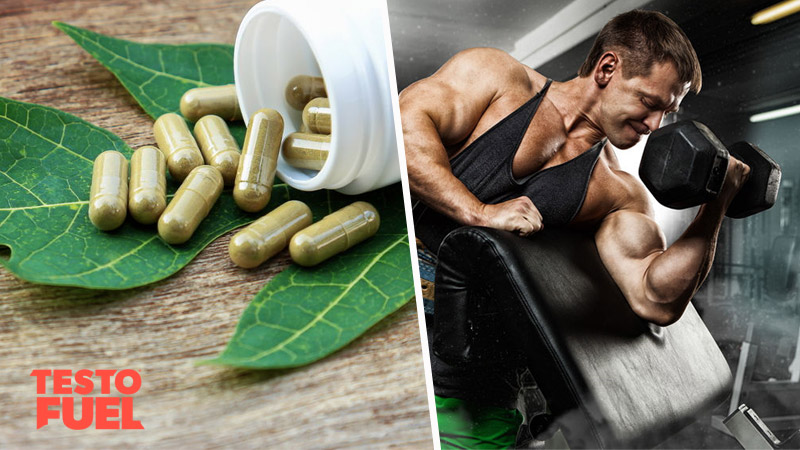TestoFuel Blog : Make Gains & Pack on the Muscle

When you’re wanting to boost your testosterone levels you need to cover all angles. That means not only training hard in the gym, but getting the right nutrition too.
Bryonia laciniosa is an Indian herb that sometimes comes up as a potential T-booster supplement.
Is it worth your hard earned cash or is it a dead end street?
In this article we take a look. Here’s what we’ll cover:
From the age of around 30 years old, your testosterone levels begin a steady decline of around 1% per year.
And as the main hormone that promotes masculinity, that’s bad. Read bad.
Testosterone has two categories of action on your body. These are:
If your T levels aren’t functioning properly, you run the risk of losing the anabolic-androgenic benefits that this steroid hormone provides.
This means that you’ll lose muscle mass, see a steady increase in belly fat and man boobs, and your risk of metabolic disease goes up too.
There are a number of nutrients that have been seen to elevate testosterone levels.
Could byronia laciniosa be one of them?
Bryonia laciniosa is a flowering plant native to South Asia, as well as parts of Eurasia.
Otherwise known as Brionia, Devlip’s Turnip and English Mandrake, you’ll find it growing wildly throughout India, Philippines and some parts of Africa.
It is a perennial, climbing plant, characterized by bell-shaped flowers and single red berries. Its seeds are known as Shivlingi due to their upper surface having markings that resemble the Hindu deity Lord Shiva.
It has a distinct taste that is both pungent and foul and can be found in seed form or pill as a supplement.
Bryonia has been used in Ayurvetic medicine as a sexual enhancer for hundreds of years. It is also said to have anti-inflammatory and anti-diabetic benefits as well.
It is currently marketed as an androgenic booster, with the ability to elevate libido, sexual function and fertility as well as boost anabolic hormone levels.
Bryonia laciniosa contains a small number of bioactive compounds. These include punicic acid (found in pomegranates) and the fiber glucommanan (often found in fat burner supplements).
One study has shown that doses of 500 mg per kilogram of body weight can reduce symptoms of fever – much like that of paracetamol [1]. This is what’s referred to as an antipyretic effect.
The same study reported that the herb could reduce sensations of pain too.
Anecdotal evidence suggests that the herb can boost brain power and improve memory, although there are no studies to confirm this.
Ethanol extract of Bryonia seeds was found to improve blood glucose, lipids and cholesterol levels with doses of 500 mg per kilogram of body weight [2].
This was over a 6-week basis.
It’s worth noting though that this is based on experimental animal studies and there is no human data to back this up. It’s far too early to say for sure that this herb can improve blood sugar profiles in humans with any real confidence just yet.
Key Point: Bryonia laciniosa might have some health benefits, but with only rat studies to draw upon as evidence, reliability is currently questionable.
As it stands, Bryonia is a very understudied herb. And the studies that do exist are animal trials, not humans so it’s difficult to assess how valid the results are.
One of the very few studies available was conducted at the Gour University in India back in 2010 [3].
In the study, varying doses of Bryonia extract were given to a group of male albino rats over a period of 28-days. The research team wanted to see what the herb did to their sexual behaviour, testicular weight and testosterone levels.
The research team reported that Bryonia extract increased serum testosterone levels, as well as its pre-cursor hormone luteinizing hormone. Additionally, they also noted that the rats had a higher libido (as measured by how often they wanted to ‘mount’ female rats).
It means that bryonia might be an interesting herb for future research. Since this animal study, there have been no human trials to study the ‘next phase’ of this herb’s reliability as a testosterone booster.
And that in itself is concerning. We strongly suggest that until more research has been conducted, you avoid Bryonia supplements.
When you’re searching for a reliable and valid T-booster supplement you should always look at the available research. And whilst animal studies can be useful, they are always a red flag in the absence of human data.
Key Point: The only evidence that bryonia could enhance testosterone levels comes from a rat study. There is currently no human evidence to draw upon.
As an understudied herb, there is no compelling evidence that Bryonia will elevate your testosterone levels. And whilst the limited research on animals is interesting, it leaves a lot to be desired when compared to more robustly researched nutrients.